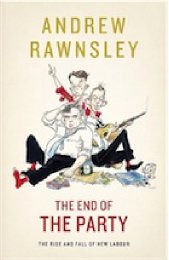The end of the party
The Rise and Fall of New Labour
Authors:
Andrew Rawnsley
Retail Price (Softback):
Retail Price (Ebook):
ISBN: 9780670918515
First Published: 2010
Description:
What it says on the cover:
In the words of one reviewer, Andrew Rawnsley take sthe reader 'into the room or the heicopter or on to the leather seats of the ministerial car'.
His bestselling and award-winning Servants of the People was accalaimed across all media as the most entertaining account of the making of New Labour and its first term in office. As another reviwer put it,'Rawnsley's ability to unearth revelations at the highest level of government may leave you suspecting that there are bugs at Number 10.'
The End of the Party delivers more of the astaonishing revelations, penetrating insights and sharp wit that readers expect from Britain's foremost commentator and television documentary maker. It takes up the New Labour story from the day of the second election victory in 2001. The reader is treated to riveting inside accounts of all the key events, from 9/11 and the Iraq war to the financial crisis and the parliamentary expenses scandal. There are sharp and vivid character portraits of all the main players as Rawnsley takes us through the triumphs and tribulations of New Labour, as well as the incendiary pribvate feuds and remarkable reconciliations between, Tony Blair, Gordon Brown and Peter Mandelson.
The End of the Party draws on hundreds of interviews and confidential conversations with those at the heart of power for more than a decade. Taking the reader behind the black door of Number 10, it is overflowing with extraordinary anecdotes which depict the powerful as they really are.
Servants of the People was praised for the acuity of its judgements and the sheer excitement of its narrative. in The End of the Party Andrew Rawnlsey now provides the definitive account of the rise and fall of New Labour.
Viking

























Your Opinions and Comments
Rawnsley was impressive and demonstrated a excellent recall of events and described them with good humour. I believed his account of the 'Brown is a bully' issue that had dominated recent headlines. But I felt that there was much more to the book than the headline grabbing stories designed to sell papers (and books) rather than make some assessment of the last 10 frenetic political years.
I felt Rawnsley had captured the personalities and characteristics of the main players (Blair, Brown and Mandleson) and demonstrated that their actions were restricted by them.
The question I wished I had asked was at any time in the History of New Labour was there a 'Cometh the hour, cometh the man' moment. I shall read the book to see if there was, and what the moment was.